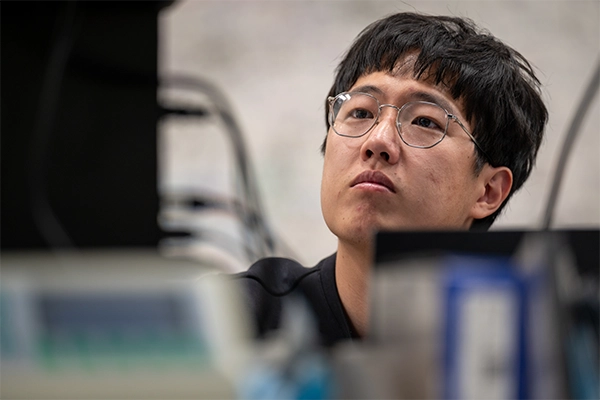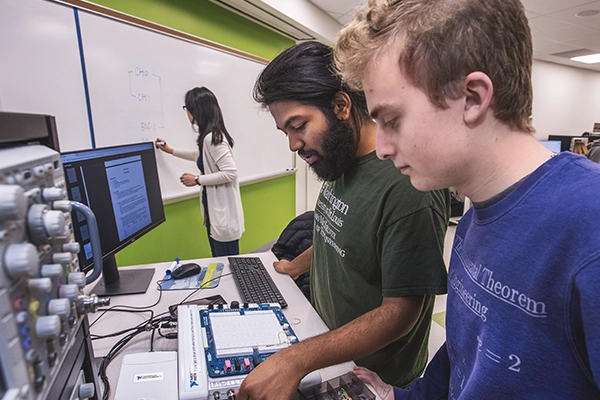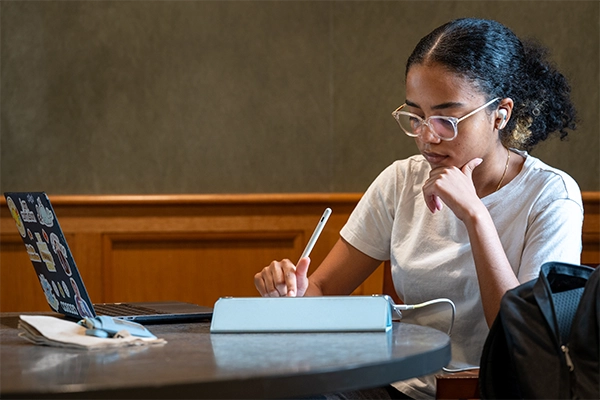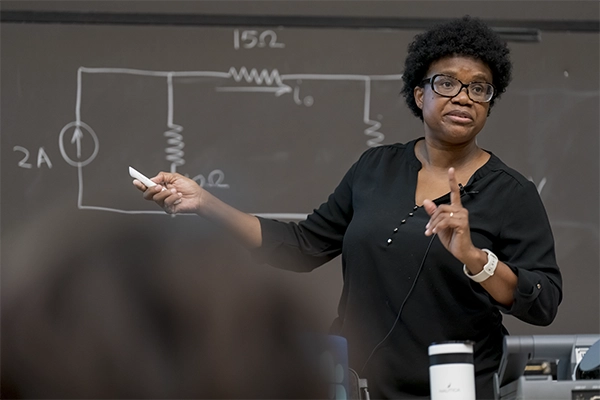It's easy to start your application.
Academics
Resources for Current & Prospective Students
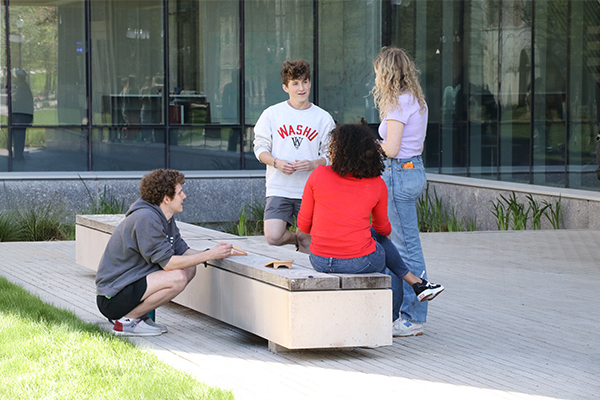
The resources found below are intended to answer any questions you have along your recruitment and academic journey. If you have any questions, feel free to reach out to ese@wustl.edu, engineeringgradadmissions@wustl.edu and ESE faculty. Get connected with events from electrical & systems engineering, McKelvey engineering and WashU. Follow #WashUESE on social media.
Is there something that we missed? Send your suggestions to ese@wustl.edu.
Tour of Green Hall at WashU
Welcome to Green Hall, home to the Preston M. Green Department of Electrical and Systems Engineering at Washington University in St. Louis. Located on the northeast corner of the Danforth Campus and recognizable by its beautiful archway, Green Hall is a hub of academic excellence and innovation.
Financial - fellowships
All full-time PhD applications are reviewed for full financial support (tuition and health fee remission, stipend). Most offers of financial support are guaranteed for up to six years, as long as the student is making progress toward completion of the degree. Below are additional resources in which to apply.
Federal Student Aid
Federal financial aid for PhD students is processed by Engineering Graduate Financial Aid. Candidates should complete the Free Application for Federal Student Aid (FAFSA) for the appropriate academic year. Contact: Engineering Graduate Financial Aid, mckelveygradfinancialaid@wustl.edu, 314-935-6183
The Ann W. and Spencer T. Olin – Chancellor’s Fellowship
The Ann W. and Spencer T. Olin-Chancellor’s Fellowship (OCF) is an elite cohort of outstanding graduate students with wide-ranging backgrounds and from varied disciplines. The OCF is committed to nurturing a variety of distinctive backgrounds and perspectives. The OCF particularly values students who have demonstrated a commitment to gender and racial diversity, equity and inclusion.
McDonnell International Scholars Academy
The McDonnell Academy is an endowed fellowship program that offers generous financial support towards graduate and professional degree studies at Washington University in St. Louis.
Forms/links
Find a full list of forms here.
Forms:
- PhD Qualifying Exam
- PhD Lab Affiliation
- PhD Research Advisory Committee Approval
- PhD Dissertation Defense Approval
Supplemental:
- Doctoral Student Handbook
- Graduate Bulletin
- Academic Calendar
- Doctoral Programs
- Doctoral Program Policies
- Transfer Credit
- Orientation 2024
Handbooks:
Above are links to previous handbooks. Students are responsible for the rules given based upon start year.
Prospective students
We hope to see you soon!
ESE has a lot of ways to connect and learn about the department. Join us for one of our upcoming virtual information sessions! This will allow you to connect with faculty, students and admissions staff. Have questions you would rather ask 1-on-1? Reach out to our faculty and PhD student advisory group! Doublecheck the application checklist and the application deadline.
Start your application now! Apply Here!
Info Sessions
ESE will be hosting a series of virtual information sessions allowing you to connect with our faculty, students, and admissions staff. Please check back at this page as new dates may be added based on demand.
You are eligible for an application fee waiver* if you attend an information session.
*Fee waivers will not be provided at the Admissions Cram Session.
9 a.m., September 27, 2024
7 p.m., October 18, 2024
9 a.m., November 6, 2024
8 p.m., November 21, 2024
All times listed are in U.S. Central Time / UTC-5.
Why Get a PhD from ESE?
Are you interested in getting your PhD in applied physics, electrical engineering, systems engineering and imaging? Watch the video to gain some inspiration from current faculty and students.
Have more questions? Learn more about getting a PhD in McKelvey Engineering with this playlist.
FAQ
How long does it take to earn a PhD?
While there is no fixed time to complete a PhD, most students finish in approximately five years.
What is the typical educational background of admitted PhD students?
A typical student admitted into the ESE PhD program has an undergraduate education in Engineering, Physics, Mathematics, or other STEM disciplines.
How do I choose a lab/faculty to work with?
Upon joining the ESE program at WashU, students have to do two rotations during their 1st yr. These rotations can be done with any ESE or affiliated faculty. By the start of the second year of study, the student must identify a faculty member willing and able to support their dissertation research as the PhD dissertation advisor.
What is the amount of time required weekly for research in PhD?
Students are expected to commit 40 hours/week towards the program. This includes time for both academic coursework as well as research.
Will I have time to have a social life?
You are encouraged to have a social life and to build a community of friends and peers. You will have as much time for a social life as you would in any other full-time job.
What does it mean to be "fully funded"?
We provide monetary support for living expenses and tuition. This stipend is adjusted each year for living expenses. To learn more, watch our PhD in ESE video.
Will I be able to obtain outside scholarships?
Yes. Information on the various outside scholarships and how to apply for them is available at the Office of the Provost website.
Financial - fellowships
Master’s students are expected to be self-supporting. However, see below for a limited list of fellowships, research assistantship opportunities & aid available for full-time master’s students.
The Master’s Honors Program is intended to recognize the top ESE Master’s students who are also engaging faculty in research. Students accepted into the ESE honors program will have their participation in the honors program officially noted on their transcripts along with expedited consideration for admission to ESE Ph.D. programs.
Department Chair's Master's Fellowship
This fellowship provides master of science degree candidates a financially-supported research position during their master's studies. Students from other engineering fields and STEM disciplines are also encouraged to apply.
See the next tab to learn more.
Master's Fellowship & Research Assistantship
We invest in graduate students and their contributions to advancing our research. The following opportunities are limited, require no application and rely on faculty funding. Please contact your academic department for more information. You can find more information here.
-
Master of Science Research Assistantship: A PI will provide a two-year research assistantship to full-time Master of Science students who conduct research. The financial support for this research assistantship is 80 percent of what a PhD student receives. In addition, the School of Engineering & Applied Science will provide full tuition remission for students receiving this assistantship. The research expectations for the master’s student should be equivalent to approximately 80 percent of what is expected from a full-time PhD student. The Master of Science Research Assistantship is exclusively available for Master of Science students, providing substantial support with an 80% financial equivalent to a PhD, a full tuition waiver, spanning a duration of 2 years, and requiring an 80% time commitment to project or research, akin to a PhD program.
-
Master’s Fellowship: A PI may provide a fellowship to any full-time current master’s student who, by virtue of the student’s academic background and record, satisfies a particular project need. The financial support for the fellowship is 50 percent of what a PhD student receives. In addition, the School of Engineering & Applied Science will reduce the tuition rate for the master’s student by 15 percent. The duration of the fellowship is for one semester at a time, and the research expectations for the master’s student should be equivalent to approximately half of what is expected from a full-time PhD student. The Master’s Fellowship offers 50% financial support, a 15% tuition waiver, and a minimum 1-semester duration for any master’s student. Dive deep into your project or research with a dedication equivalent to 50% of a PhD program.
Financial Assistance for Admitted and Current Graduate Students
Master’s students are expected to be self-supporting. There are limited fellowship and research assistantship opportunities available for full-time master’s students. Participants in the Bachelor's/Master's Program and the Dual Degree Program could qualify for institutional scholarships. Visit Financial Assistance for Admitted and Current Graduate Students for more information and how to apply to financial assistance.
Testimonial: Department chair's fellowship - Murphy Kilgore
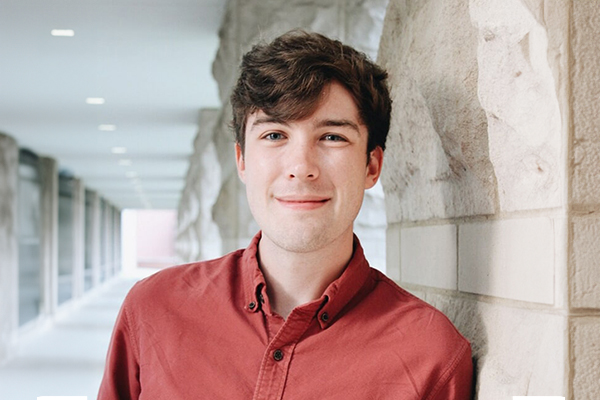
Q: How did being a part of this fellowship enhance your graduate studies and research experience?
A: Being part of the fellowship allowed me to learn and develop skills that are not possible to fully achieve in the classroom. For example, I was allowed to go through the full design process for Integrated Circuit Chips including the testing process after manufacturing. Being in this fellowship also allowed me to get connected to faculty and PhD students very early during my time at the university which allowed for a much smoother start to my research. Doing research with the fellowship also allowed me to apply the skills I learned in the classroom to cover gaps in learning. I believe that I was able to have an experience doing a masters that not many students were able to have.
Q: In what ways did the financial support provided by the fellowship impact your ability to focus on your research?
A: The financial support allowed me not only have no worries attending the university but also to have a livable wage within St. Louis. This allowed me to not have to look for secondary jobs and entirely focus on performing research on a high level. This also meant that I could still vacation during school breaks to prevent burnout when needed.
Q: How has your experience in the fellowship influenced your career goals or aspirations?
A: The fellowship really allowed me to explore what I wanted to do with my career. I came to the university unsure as to what I really wanted to do for work as my undergraduate university did not have the opportunities that WashU had both in courses and research. I really got to find what I loved doing and explore what aspects I would like to focus on with my masters degree. As I came here my career aspirations definitely shifted around as I explored different research topics and having the opportunity here was a major factor in deciding which career direction I wanted to pursue.
Q: How did being a part of this program contribute to your overall graduate school experience?
A: Being part of this program let me experience many things that the normal masters student would not get to be a part of. During my masters I was able to work with career professionals in multiple different fields, students at multiple universities across the country, and explore many different aspects of electrical engineering. Though it is a lot of work to have courses and perform research, I believe all of it is worth it since I was able to become highly trained when moving into the workforce which really helped me to find great jobs.
Forms/links
Find a full list of forms here.
Forms:
- Master's Thesis/Project Request
- Master's Transfer Credit Request
- Master's Independent Study Request
- Master's Thesis Final Defense Approval
- Master's Request for Leave of Absence
- Master's Thesis Committee
- Master's Research Form
Supplemental:
- Master's Student Handbook
- Master's Thesis
- Master's Final Examinations
- Graduate Bulletin
- Academic Calendar
- Master's Certificates
Policies:
Handbooks:
Above are links to previous handbooks. Students are responsible for the rules given based upon start year.
International:
E60 505: Communication Tools for Academic and Professional Success
The McKelvey School of Engineering requires all incoming international students who submit a TOEFL or IETLS score or has not obtained a minimum of three years of education in the U.S. to take a course in communication. This new course was first offered in Fall of 2018. This course does not cost extra for full-time students and is not counted toward the degree or the GPA.
Prospective students
We hope to see you soon!
ESE has a lot of ways to connect and learn about the department. Join us for one of our upcoming virtual information sessions! This will allow you to connect with faculty, students and admissions staff. Do you have questions you would rather ask 1-on-1? Reach out to our faculty and Master's student advisory group! Doublecheck the application checklist and the application deadline.
Start your application now! Apply Here!
Info Sessions
ESE will be hosting a series of virtual information sessions allowing you to connect with our faculty, students, and admissions staff. Please check back at this page as new dates may be added based on demand.
You are eligible for an application fee waiver* if you attend an information session.
*Fee waivers will not be provided at the Admissions Cram Session.
Check back soon for new dates.
All times listed are in U.S. Central Time (UTC-5).
Research & projects
Curious about academic research? Gain experience in world-class ESE labs as an undergraduate researcher working with accomplished faculty. Watch our video below to learn more. Student research projects receive robust support from faculty mentors and an array of university resources, ensuring a comprehensive and enriching academic experience.
For more information, check out the undergraduate research page and discover some of our previous projects. Inspired and want to start you own project? Check out ESE 498 and ESE 499 to learn more.
Forms/links
Prospective students
Welcome to the Preston M. Green Department of Electrical & Systems Engineering! As a prospective student, you are on the brink of joining a dynamic and innovative community. Here, you will have the opportunity to work alongside distinguished faculty and engage in cutting-edge research that spans a wide range of topics. Our program is designed to equip you with the skills and knowledge needed to excel in the rapidly evolving fields of applied physics, devices & circuits, signals & imaging and systems science. We are excited to help you embark on this transformative journey and look forward to seeing the impact you will make in our department and beyond.
The McKelvey School of Engineering Undergraduate Student Services offers undergraduate students many ways to receive academic and resource support. All questions can be sent to our email address, euss@wustl.edu or schedule an appointment with your adviser or relevant person in our office.
Have some questions about ESE? Reach out to our Undergraduate Student Advisory Board!
FAQ
Have some questions? We're sure you do. Use the following FAQ to learn more about WashU and ESE. Don't see an answer to you question? Reach out to ese@wustl.edu.
Why should I choose to study at WashU?
Washington University is a prestigious private university, which creates stability (we don't rely on direct government funding for our operations), flexibility, and opportunity. Saint Louis is a city with a low cost of living and a high quality of life (many students and faculty have a short, pleasant walk to school). However, it is big enough to be cosmopolitan and to offer many cultural, dining, and entertainment opportunities.
The ESE department at WashU brings together cross-disciplinary research in applied physics, devices & circuits, signals & imaging and systems science with the goal of conducting groundbreaking research to create a positive imact on the local community and world. A student wanting to study in the ESE department at WashU will be part of a community of research, education, and collaboration to support discoveries that address future global challenges.
What can I do with a degree in Electrical Engineering
Students who graduate with a degree in Electrical Engineering from ESE have a wide range of options for future careers. The following include examples of where current students are employed.
- Faculty (e.g. Shanghai Jiao Tong University, The University of Tokyo, The George Washington University)
- Post-Doctoral Fellows (e.g. Caltech, Stanford University)
- Industry (e.g. Siemens, Mastercard, Boeing, Tesla, Meta)
- Startups (e.g. metalenz)
- National Research Labs (e.g. MIT Lincoln Laboratory, Sandia National Laboratories, SPARK at Stanford)
What can I do with a degree in Systems Engineering
Students who graduate with a degree in Systems Engineering from ESE have a wide range of options for future careers. The following include examples of where current students are employed.
- Industry (e.g. Deloitte, At&T, Capital One, Citi)
- Government (e.g. Federal Reserve Board, U.S. Department of Homeland Security)
- Startups (e.g. C3 AI)
- National Research Labs (e.g. The Johns Hopkins University Applied Physics Laboratory)
Undergraduate research & internships
How do I find a research experience?
Research is a great way to get some real project-based experience, especially early in college when it can be more difficult to procure an internship. The good news is that there are many ways to get involved in research on campus and elsewhere!
The easiest way to get involved in research is to contact a faculty member directly. Check out the ESE undergraduate research page to learn about some of the open and ongoing projects available. Go to ESE student projects to get some inspiration from previous student projects. You can also go to McKelvey undergraduate research projects and WashU Arts & Sciences Office of Undergraduate Research.
How do I find an internship?
Although it can be challenging to get a summer internship (especially early in college), persistence can pay off. Here are some quick things you can do:
-
Connect with the WashU Center for Career Engagement and have someone look over your resume and discuss tips for interviewing.
-
Attend the Engineering Career Fair (usually scheduled each September) and other campus career fairs. Even if you don't necessarily apply for something, it can be good practice to talk with the industry representatives.
-
Apply, apply, apply! Some good sites to help you search are Indeed, Glassdoor, and USAJobs (for government positions). Periodically check back every 2-3 weeks for updates and new postings. Utilize LinkedIn and see if you have any connections at the company in which you are applying.
- Network! Networking will help you make connections and land a new internship and positions. A good way to convince yourself to attend such events is view it as skill-building. Even if you aren't good at it now, you will get better with practice. Attending events such as Venture Cafe at Cortex or conferences will help expand your network. Also joining WashU CNX and the ESE Alumni & Student LinkedIn will also introduce you to a mentor and a community.
-
Research! Consider joining a lab. This is a great way to get some real world experience and will grow you network.
Is St. Louis safe?
Overall, St. Louis is a safe and healthy city, with crime rates that are typical of medium-sized US metropolitan regions. St. Louis, like other major cities, faces social disparities and inequities, and some neighborhoods are safer than others. WashU is committed to promoting systemic change and keeping students safe. The ESE program is centrally located on WashU’s Danforth Campus. Adjacent to campus you’ll discover a rich cultural life that supports your time outside of the classroom: the coffee shops and music venues of the Delmar Loop, as well as the museums and trails of nearby Forest Park, voted “Best City Park” by USA Today. The campus is served by several MetroLink light rail stations and bus lines, making the area easy to navigate. Go to police.wustl.edu for statistics and information recommended for safety precautions. Learn more about St. Louis.
For all emergencies, call 911.
If you are on campus and need assistance, you can call the Washington University Police Department (WUPD) at (314) 935-5555 on the Danforth Campus or call the School of Medicine Protective Services at (314) 362-4357 on the Medical Campus. Sign up for the WUSTL emergency notification system and learn where to go in case of an emergency. Use a blue light telephone to request WUPD assistance.
The blue light emergency telephone system is a series of highly visible telephones strategically located throughout the Danforth Campus (view the map) and extending into areas of university-owned off-campus housing. The telephones off campus have a direct link to the local police serving that area; on campus they connect directly to the Washington University Police Department.
The Campus2Home shuttle provides a safe ride home between the hours of 6 p.m. and 4 a.m. daily from the Washington University in St. Louis Danforth Campus to off-campus residences in four designated areas. These areas are: Skinker-DeBaliviere, the Loop South, north of the Loop and just south of campus (view the shuttle route boundaries).
Housing & Transportation
There are a number of resources offered by the Graduate School in regard to housing, transportation and support for both domestic and international students. All students have access to a free UPass which covers universal rail and bus transportation. To schedule your day use the Metro St. Louis tip planner. Go to parking.wustl.edu to purchase a parking spot on campus. See a list of housing resources and close neighborhoods below.
Quadrangle
Discover the best of Washington University off-campus with our diverse selection of unique properties. Nestled in neighborhoods surrounding the WashU campus, our residences offer a home-like feel while allowing you to explore new parts of St. Louis and stay connected to the University.
Apartment Referral Services
Connecting the WashU Community to Off-Campus Housing Options. You can find roomates at the Apartment Referral Services, Roomsurf and ULoop.
The Central West End
Just east of Washington University, this vibrant mixed-use district is situated on the eastern edge of the beloved Forest Park. Whether you're in the mood for upscale dining or a cozy coffeehouse, a bookshop or a contemporary boutique, a world-class art gallery or live music, you'll find it all here. Explore the eye-catching public art and stunning turn-of-the-century homes that make this neighborhood unique. It is within close proximity to campus and is accessible to the campus via the Gold line Metro Bus. It is an approximately 5-10-minute drive from the Central West End to Washington University Danforth Campus. The Metro link station runs through the medical school campus, taking you to various places throughout St. Louis.
The Loop/University City
Just north of the Washington campus and east of Clayton. The American Planning Associated has call the Loop as "One of the 10 great streets in America." The Loop is within walking distance from Washington University or is accessible via the Green Washington University shuttle line.
Clayton/Brentwood
Officially the home of Washington University, St. Louis County’s government, and the Central Business District. Clayton lies west of Washington University campus. Clayton holds the St. Louis the St. Louis art fair each year, which is rated one of best in the nation. These Clayton/Brentwood communities consist of quiet, friendly neighborhoods that are within close proximity to campus. The Gold and Red line Metro buses transport students to and from this area. It is an approximately 5-mintue drive from Washington University to Clayton area. The St. Louis Metrolink also has stops in both the Clayton and Brentwood areas.
The Grove
“St. Louis' Bohemian Paradise”: This vibrant district, situated in a central location, spans almost a mile along Manchester Avenue from Kingshighway to Vandeventer. It features a diverse array of more than 50 businesses, including restaurants, bars, dance venues, shops, cafes, a brewery, tattoo studios, and various organizations dedicated to enhancing the area's vitality.
Dogtown
This charming neighborhood is filled with restraunts and shops and is situated just south of Forest Park. Here, you are walking distance to the St. Louis Zoo.
Cost of Living
St. Louis is consistently recognized for its affordability and low cost of living. Students coming to St. Louis from metropolitan areas across the country are often surprised to find the cost of housing, utilities, transportation and groceries throughout the city. This Cost of Living calculator serves as a helpful tool in understanding the cost-of-living index in St. Louis relative to other cities.
Mental Health, Wellness & General Resources
I am struggling and feeling overwhelmed with my work here; what should I do?
The life of a student at an institution such as Washington University can at times be difficult. Course work, student groups, obligations to family,part-time employment -- all of these can conspire to make your plate quite full. Then, too, we know that depression as an illness can and does develop in college-age students.
It is important first and foremost to take care of yourself. If you, your instructors, your advisors, or your friends develop concerns about your well-being, you are encouraged to explore the services available for counseling, starting with this page. Note that in addition to regular counseling, the Habif Wellness Center offers "drop-in"-style meetings with counselors through the Let's Talk program. If you're concerned for someone you know and aren't comfortable talking to them about it, you can complete a WashU Cares report so that someone will check in on them.
If somebody you know is in crisis (including, of course, yourself), then information for quick response can be found here. If help is needed immediately, you should call 911.
The Habif Health and Wellness Center's mission is to foster a compassionate and inclusive environment that supports each Washington University in St. Louis student’s physical, mental and emotional well-being. In addition, students can participate in "Let's Talk," a program that provides students with easy access to free, brief, confidential consultations with counselors from Mental Health Services (MHS). MHS counselors hold walk-in hours on the third floor of Goldfarb Hall during which students can stop by when their schedule permits- no appointments needed.
AGES is the Association of Graduate Engineering students and all PhD students are members. The Association offers networking events and social events. In addition, McKelvey Graduate Student Services office offers support for PhD students for a variety of issues.Eng-gradstudserv@wustl.edu
Recreational & Social Events
Forest Park
Forest Park located adjacent to the Danforth Campus is the largest public park in the US and one of the greatest civic treasures of St. Louis. It is the home to five major cultural institutions: Saint Louis Art Museum, Saint Louis Science Center, Missouri History Museum, the Muny and Saint Louis Zoo.
Tower Grove Park
Tower Grove Park is a public park and arboretum managed by an independent Board of Commissioners and dedicated staff.
- Tower Grove Farmers' Market
- Join us in Tower Grove Park every Saturday from April through October from 8am – 12:30pm.
- Festival of Nations
- The International Institute's Festival of Nations returns to Tower Grove Park in St. Louis, Missouri on August 24–25, 2024. Save the date and join the community for a celebration of music, flavors, art and culture from around the world!
Botanical Gardens
The Missouri Botanical Garden's mission is "To discover and share knowledge about plants and their environment in order to preserve and enrich life." St. Louis City/County residents enjoy discounted general admission to the Garden daily and free Garden admission on Wednesdays and Saturdays from 7 a.m.–noon, with early walking hours from 7–9 a.m.
Korean-American Association of St. Louis
The purpose of the Korean American Association of St. Louis is to represent Korean Americans in the Greater St. Louis Area by further developing the Korean community through promoting cultural education, supporting the rights of Korean Americans, and strengthening relations with other communities in the area.
St. Louis African Arts Festival
Celebrating the past, embracing the present, and empowering our future.
St. Louis Cardinals
Located just 7 mile east of the Danforth campus, the St. Louis Cardinals are an American professional baseball team based in downtown St. Louis. The Cardinals compete in Major League Baseball as a member club of the National League Central Division and have won 11 world series championships.
St. Louis Blues
Located just 7 mile east of the Danforth campus, the St. Louis Blues are a professional ice hockey team based in St. Louis. The Blues compete in the National Hockey League (NHL) as a member of the Central Division in the Western Conference and have won 1 stanley cup.
St. Louis City SC
Located just 7 mile east of the Danforth campus, St. Louis City SC is an American professional men's soccer club and competes in Major League Soccer (MLS) as a member of the Western Conference and joined in 2023 as an expansion team.
FAQ for PhD Students
Have some questions? We're sure you do. Use the following FAQ to learn more about WashU and ESE. Don't see an answer to you question? Reach out to ese@wustl.edu.
How long does it take to earn a PhD?
What is the typical educational background of admitted PhD students?
How do I choose a lab/faculty to work with?
What is the amount of time required weekly for research in PhD?
Students are expected to commit 40 hours/week towards the program. This includes time for both academic coursework as well as research.
Will I have time to have a social life?
You are encouraged to have a social life and to build a community of friends and peers. You will have as much time for a social life as you would in any other full-time job.
What does it mean to be "fully funded"?
We provide monetary support for living expenses and tuition. This stipend is adjusted each year for living expenses. To learn more, watch our PhD in ESE video.
Will I be able to obtain outside scholarships?
Yes. Information on the various outside scholarships and how to apply for them is available at provost.wustl.edu/vpge/fellowships-funding-and-support

